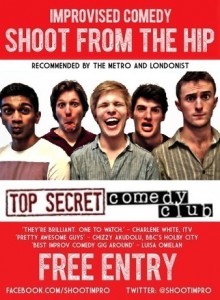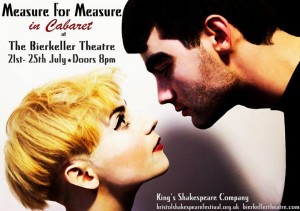Police report of “Romeo and Juliet” Confidence Scam
Location of crime: Upstairs Foyer, Greenwood Theatre, Guy’s Campus, King’s College London.
Date of crime: Evenings of 5th, 6th, 7th February 2014. The crime may also have been “rehearsed” before these dates on unwitting spectators.
Financial sponsors: A group calling itself King’s College London English Literary Society.
Nature of crime: Deconstruction of playwright’s text without single reference to post-colonial or feminist perspectives. Co-conspirator “The Friar” tore out pages of “Romeo and Juliet” text to manifest true nature of crime.
Key victims: William Shakespeare, women.
Perpetrator: Unknown. Calls himself “The Director”. Identity: Elusive. Real identity unknown. May use pseudonyms: W. Nash, Rookie Monster, DPR, Edward Snowden.
Known Co-conspirators: Marcus “The Friar” Bazley, Hillary “The Counsellor” Chua, Laura “Juliet” Deering, Jackie “Lady Capulet” Edwards, Matthew “Romeo” Hodson. Others involved in supporting the scam thought to be: Catherine Walters, Elena Gillies, Emma Lawrence, Aja Garrod, Aggi Cantril, Sophie Omar, and Kate Gardener. Notes found at crime scene indicate others may also have assisted, almost certainly without realizing the consequences.
Modus Operandi: Perp takes out-of-copyright play text, reducing number of characters, even using unwitting mark in audience to play role in deception. Play cut down and cut up, and done as crime scene investigation, with scenes “reconstructed” by “actors”. Legal counsel present to narrate events and give illusion of objectivity.
Perp uses intelligence and wit to produce amusing, clever, and sophisticated version of play, which is used as a “script” that is then executed (“performed”) by co-conspirators in front of marks. Performance of script of professional standard, and very realistic. Thus, marks easily deceived and soon suspend disbelief.
Only one of the known co-conspirators is believed to actually make his living in theatre. Remaining co-conspirators possibly being groomed.
Co-conspirators take on “roles” to execute script. Thus, “The Friar” is a Cockney ex-junkie offering life advice to the other conspirators, along with marriage ceremonies and store-and-forward messaging services; “Romeo” is a lovestruck young man, writing dreamily in his Moleskine; “Lady Capulet” is a tyrant of the household interior, a dictator of the domestic. The different “roles” cleverly interleave, and jointly enable confidence scam. Indeed, witnesses report that the acting was so intense that it approached the threshold of caricature, but without ever crossing that threshold, making the performances thrilling to watch. Co-conspirators all appear to be under direct influence of Perp.
Co-conspirators use a variety of names, including real names, to confuse audience about when co-conspirators are “acting” in their “roles”, and when not. Humour and wit used to distract attention of audience from reconstruction of double suicide, following madness of young love, set amongst inter-gang warfare in inner-city Italy.
Toying with nature of “acting” indicates this is crime of real sophistication by people with extensive experience in deception and illusion. Perp and co-conspirators may have worked in Elizabethan theatre before. Crime shows many hallmarks of two known literary deceivers and wits with Elizabethan previous, Thomas Nashe and Kit Marlowe. Neither likely involved: Nashe believed deceased, Marlowe either deceased (Deptford Regional Office view) or living in exile in Italy.
Production involves post-coitus scene, drugs, violence, suicide, and death. No rock and roll, but. One person injured by vicious slap. Music deployed very effectively to “set the scene” and relax audience in preparation for confidence scam, and at various times during the operation to manipulate emotions of marks.
Use of Barber’s Adagio for Strings obviously intended as subtle allusion to FDR’s funeral and Oliver Stone’s film about Vietnam. This double allusion should allay concerns of English Department about absence of references to post-colonial oppression and the wickedness of US global hegemony, as well as providing a warm glow of self-satisfaction to the one person who caught the allusions.
Related scams: West Side Story, High School Musical.
Known beneficiaries of scam:
- Perp and co-conspirators
- KCL English Literary Society
- Greenwood Theatre
- King’s College London
- The Horseshoe Inn, Melior Street, London
- The London theatre world
- The audience.
Progress of investigation: Police seeking the 132 witnesses to garner further information.
Public warning: These people are armed with professional acting skills and are very dangerous. Perp may be serial dramaturge, intent on career in intelligent theatre or deception. Co-conspirators capable of superb acting at the highest level.
Deptford Regional Office reports rumour that next confidence scam may take place in Copenhagen.
Conspirators also believed to hold raucous after-play parties to celebrate success of scam, involving alcohol, tobacco, witty conversation, and profound arguments about the existence of God and the nature of relationships. Kit Marlowe would feel at home. US State Department Advisory: Americans visiting London particularly at risk.
Note: Potential side-effects of scam include reviews written as police-reports, pretentiously imitating style of the production itself.





